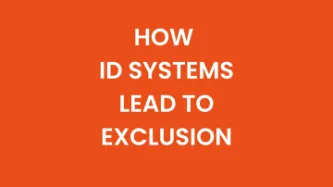Search
Content type: Long Read
We are at a war footing as we enter an era where the tech world is increasingly defined by conflict. Innovation has never been driven solely by social needs, market forces or the common good. Military imperatives have periodically played central roles in steering the development of new generations of technologies. For instance, the origins of the internet can be traced back to defence research and initiatives like the ARPANET.Now we are witnessing a significant shift: states and corporations…
Content type: Long Read
Period tracking apps and the rollback of reproductive rightsThe aftermath of the overturning of Roe v. Wade in the United States (US) sparked widespread debate and concern that data from period tracking apps could be use to criminalise those seeking abortion care.While the surveillance and criminalisation of reproductive choices are neither new nor unique to the US, the scale and intensity of today’s crisis continue to grow. To put it into perspective, 22 million women and girls of reproductive…
Content type: Long Read
In 2024, Privacy International (PI) continued to produce real change by challenging governments and corporations that use data and technology to exploit us.Since the beginning of the year, we’ve achieved some wins and would like to share the most recent ones with you.Creating change is hard, and takes time. We have to uncover problems, draw attention to them, and pressure for change. In the latest quarter, we've been able to push regulators for stronger standards on generative AI systems, draw…
Content type: Guide step
In the current digital landscape, passwords are the predominant method for user authentication across most platforms. From a privacy perspective, passwords present a advantage over some other methods like biometrics, as they do not disclose any additional or unique data about you – apart from the selected username
Given the widespread adoption of passwords, manually managing multiple, unique passwords for each online account becomes more difficult. Having unique random passwords for each…
Content type: Advocacy
Our joint stakeholder report made the following recommendations: Strengthen the implementation of Data Protection Act, 2019 and make clear in law and in relevant guidelines that personal data from the electoral register which has been made accessible is still subject to, and protected, by data protection law, including for onward processing.Ensure that there is an effective legal and regulatory framework in place to guarantee a human rights-based approach in the design and deployment of…
Content type: Advocacy
Our submission made the following recommendations to the Committee regarding the Kenya:Review and amend the proposed digital identity system, the Maisha Numba, to ensure it aligns with Kenya’s national and international human rights obligations in its design and implementation, and adopts legal, policy and technical safeguards to prevent exclusion and marginalisation.Ensure that measures taken to develop digital public infrastructures abide by Kenya’s national and international human rights…
Content type: Advocacy
In Colombia, the government utilises the National System for the Identification of Potential Social Program Beneficiaries, Sisbén (Sistema de Identificación de Potenciales Beneficiarios de Programas Sociales), a classification algorithm that ranks individuals by income level to determine access to social assistance programs. The implementation of this algorithm is problematic, and our submission raises the following issues:Sisbén is exclusionary by design. Its inefficiency in accurately…
Content type: Legal Case Files
In December 2023, Haki na Sheria filed a case titled Haki na Sheria Initiative v Attorney General & 4 others (Petition 196 of 2023) before the High Court of Kenya challenging the constitutionality of the Maisha Namba Digital Identity Ecosystem. This new system aims to digitalise civil and personal registration, utilising a Unique Personal Identification (UPI) and Digital ID, among other features. However, the new ID system still fails to address issues previously identified by PI and…
Content type: Long Read
What happened?On 19 July 2024, American cybersecurity company CrowdStrike released an update to its CrowdStrike Falcon software that ultimately caused 8.5 million computers running Microsoft Windows to crash. The damage done was both deep and wide: deep because the computers affected were unable to recover without direct user intervention. Wide because a whole range of companies - from airlines to healthcare to media - across a whole range of countries - from Sweden to India to New Zealand -…
Content type: Long Read
In 2019, the Waorani achieved a huge legal victory against the Ecuadorian government. They opposed the sale of millions of hectares of their rainforest to new oil companies, a forest that forms part of the home and territory of seven different Indigenous peoples in the southern Ecuadorian Amazon. Nemonte Nenquimo, as the first female leader of the Waorani of Pastaza and co-founder of the nonprofit Alianza Ceibo, and plaintiff in this case, has been a powerful advocate for her community’s…
Content type: Long Read
IntroductionIn early October this year, Google announced its AI Overviews would now have ads. AI companies have been exploring ways to monetise their AI tools to compensate for their eye watering costs, and advertising seems to be a part of many of these plans. Microsoft have even rolled out an entire Advertising API for its AI chat tools.As AI becomes a focal point of consumer tech, the next host of the AdTech expansion regime could well be the most popular of these AI tools: AI chatbots.…
Content type: Long Read
Education is a fundamental human right outlined in the Universal Declaration of Human Rights (Article 26), which states that everyone has the right to education. Schools play a core role in the education of children, but it’s also in schools that children are encouraged to learn to work with others, and to develop their own identities and emotional skills. The education process doesn’t stop there, it continues as children grow and make their way through different higher educational spaces such…
Content type: Long Read
Table of contentsIntroductionWeighing the (potential) benefits with the risksPrivacy rights and the right to healthThe right to healthPrivacy, data-protection and health dataThe right to health in the digital contextWhy the drive for digitalImproved access to healthcarePatient empowerment and remote monitoringBut these same digital solutions carry magnified risks…More (and more connected) dataData leaks and breachesData sharing without informed consentProfiling and manipulationTools are not…
Content type: Advocacy
What's happening with digital ID in Kenya?In 2018, the Kenyan government tried to introduce the Huduma Namba project. Among other things, the project established the National Identity Integrated Management System (NIIMS); a centralised database purposed to consolidate all government records about an individual into a single ID system. In April 2019, PI submitted an expert affidavit challenging the NIIMS. In 2020, the High Court of Kenya acknowledged several key issues raised by PI in its…
Content type: Advocacy
In the last few years, electoral processes and related activities have undergone significant changes, driven by the development of digital technologies.The use of personal data has redefined political campaigning and enabled the proliferation of political advertising tailor-made for audiences sharing specific characteristics or personalised to the individual. These new practices, combined with the platforms that enable them, create an environment that facilitate the manipulation of opinion and…
Content type: Long Read
IntroductionData about our health reveals some of the most sensitive, intimate - and potentially embarrassing - information about who we are. Confidentiality is, and has always been, at the very heart of medical ethics. People need to be able to trust their doctors, nurses and other healthcare providers so that they are not afraid to tell them something important about their health for fear of shame, judgement or social exclusion.It’s no surprise then that data protection regimes around…
Content type: Explainer
On International Identity Day, we are highlighting that the technology-driven ID systems being implemented around the world are leading to new forms of surveillance and exclusion.Last September, PI and its global network of partners launched Identity Crisis - a campaign to change the narrative on identity systems. Around the world PI and our partners have seen ID systems creating and facilitating exclusion, insecurity, and surveillance.To learn more, watch our Identity Crisis video, in which…
Content type: Advocacy
Our submission focussed on the evolving impacts of (i) automated decision-making, (ii) the digitisation of social protection programmes, (iii) sensitive data-processing and (iv) assistive technologies in the experiences and rights of people with disabilities.We called on the OHCHR to:Examine the impact that growing digitisation and the use of new and emerging technologies across sectors has upon the rights of persons with disabilities;Urge states to ensure that the deployment of digital…
Content type: People
Karla currently leads Privacy International's Protecting People's Dignity strategic area, which is dedicated to strengthening frameworks and mechanisms that ensure individuals affected by exclusion, discrimination, and unlawful surveillance can safely and equitably access and enjoy their fundamental rights. Karla has extensive experience in the regulatory sector, having served as a Senior Legal Advisor at the Federal Telecommunications Institute of Mexico and as Head of the Office of…
Content type: Case Study
This piece was written by Privacy International, based on publicly available information and on research by our partners at Hiperderecho
Overview
The Documento Nacional de Identidad (DNI) is the personal ID card recognised by the Peruvian State in any situation where a person might have to identify themselves, be it in an administrative, judicial, civil, or commercial context. The DNI also grants its holder the right to vote.
The DNI issuing and overseeing body is the Registro Nacional de…
Content type: Advocacy
The European Union Artificial Intelligence Act (AI Act) will regulate the development and use of ‘high-risk’ AI, and aims to promote the uptake of ‘trustworthy AI’ whilst protecting the rights of people affected by AI systems.
However, in its original proposal, the EU AI Act does not adequately address and prevent the harms stemming from the use of AI in the migration context. Whilst states and institutions often promote AI in terms of benefits for wider society, for marginalised communities,…
Content type: Long Read
Introduction
India’s educational system is the largest in the world, with over 250 million students, 50% of whom attend publicly administered schools.
The autonomy given by the Indian Constitution to the 28 states and 8 union territories means that the right to education is implemented quite differently in each one, respecting culture, language, and other local specificities. Educational policies are suggested at the national level by various autonomous agencies and states can implement them in…
Content type: Key Resources
The fact of the matter is: your ID system will exclude, and the people it’s excluding will be the most vulnerable and marginalised.
Content type: Advocacy
We, the undersigned civil society organizations and individuals, urge the World Bank and other international organizations to take immediate steps to cease activities that promote harmful models of digital identification systems (digital ID).
The signatories of this letter are located in different countries, work with diverse communities, and bring a wide range of expertise. Among this group, there are many shared concerns and similar experiences documenting the harmful impacts…
Content type: Advocacy
Read in English
Nosotros, las organizaciones de la sociedad civil y los individuos abajo firmantes, instamos al Banco Mundial y a otras organizaciones internacionales a que tomen medidas inmediatas para cesar las actividades que promueven modelos perjudiciales de sistemas de identificación digital (ID digital).
Los firmantes de esta carta se encuentran en diferentes países, trabajan con diversas comunidades y aportan una amplia gama de conocimientos. Entre este grupo, hay muchas…
Content type: Long Read
Introduction
In response to the unprecedented social, economic, and public health threats posed by the Covid-19 pandemic, the World Bank financed at least 232 "Covid-19 Response" projects. The projects were implemented across countries the World Bank classifies as middle and low-income.
This article will focus on eight (8) Covid-19 Response projects which sought to deliver social assistance to individuals and families on a "non-contributory" basis (this means that the intended beneficiaries…
Content type: News & Analysis
Privacy International (PI) has today filed complaints with the Information Commissioner (ICO) and Forensic Science Regulator (FSR) against the UK Home Office's use of GPS ankle tags to monitor migrants released on immigration bail. This policy and practice represents a seismic change in the surveillance of migrants in the UK. PI was first alerted to this scheme by organisations such as Bail for Immigration Detainees, an independent charity that exists to challenge immigration detention in the…
Content type: Advocacy
Today, PI filed a complaint with the Forensic Science Regulator (FSR) in relation to quality and accuracy issues in satellite-enabled Global Positioning System (GPS) tags used for Electronic Monitoring of subjects released from immigration detention (GPS tags). We are concerned there may be systemic failures in relation to the quality of data extracted from tags, processed and interpreted for use in investigations and criminal prosecutions.
The GPS tags are used by the Home Office to…
Content type: Long Read
The global COVID-19 health crisis not only induced a public health crisis, but has led to severe social, economic and educational crises which have laid bare any pre-existing gaps in social protection policies and frameworks. Measures identified as necessary for an effective public health response such as lockdowns have impacted billions workers and people's ability to sustain their livelihood worldwide, with countries seeing unprecedented levels of applications for welfare benefits support,…



























